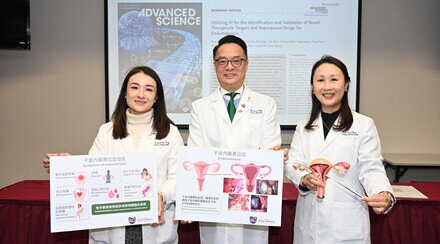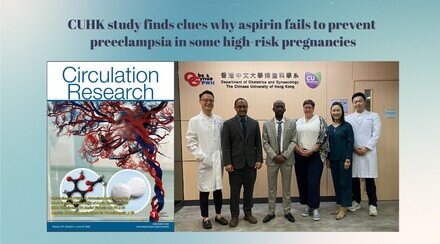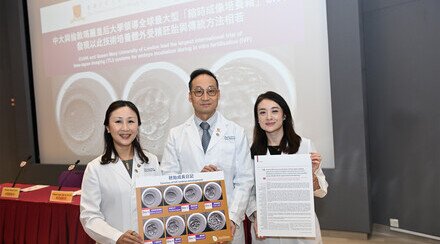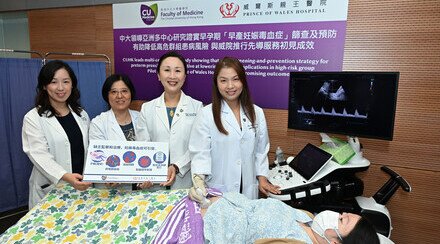CUHK and FPAHK launch the Jockey Club Genetic Carrier Screening Programme for High Risk Couples
Every parent wants to have a healthy baby. However, 0.2% to 0.3% of couples are asymptomatic carriers of genetic diseases that lead to adverse pregnancy outcomes, including repeated miscarriage, malformation or disability. To raise public awareness of genetic health, The Chinese University of Hong Kong (CUHK)’s Faculty of Medicine (CU Medicine) has collaborated with The Family Planning Association of Hong Kong (FPAHK) to the Jockey Club Genetic Carrier Screening Programme for High Risk Couples. With “Preg-at-ease” as the slogan, the programme is funded by The Hong Kong Jockey Club Charities Trust and will provide genetic counselling and genetic screening tests for couples at high risk of carrying genetic diseases, offering them early support.
Additionally, the programme will glean new information on the local carrier status, while healthcare professionals will be trained to cope with the increasing demand for pre-conception genetic counselling services.

CU Medicine has collaborated with FPAHK to launch the Jockey Club Genetic Carrier Screening Programme for High Risk Couples. With “Preg-at-ease” as the slogan, the programme is funded by The Hong Kong Jockey Club Charities Trust and will provide genetic counselling and genetic screening tests for couples at high risk of carrying genetic diseases, offering them early support.
(From left) Dr. Chong Shuk-ching, Associate Professor of Practice in Medical Genetics, Department of Obstetrics and Gynaecology and Department of Paediatrics, CU Medicine; Dr. Mona Lam, Executive Director of FPAHK; Professor Leung Tak-yeung, and Dr. Jacqueline Chung, Associate Professor, Department of Obstetrics and Gynaecology, CU Medicine; and Mr Sean Leung, Executive Manager, Charities, The Hong Kong Jockey Club Charities Trust.
elit.
The programme will provide genetic counselling and genetic screening tests for couples, that are planning pregnancy (in which the female partners are of reproductive age), not currently pregnant, and at the age of 18 or above. The service will be provided free of charge to holders of Hong Kong Identity Card and meeting any one of the following criteria:
- Two or more miscarriages, or having experienced repeated foetal malformations or disabilities
- Previous unexplained foetal or neonatal conditions
- Consanguineous marriage (first- and second-degree relatives; the couple has a higher chance of having the same defective gene)
- Strong family history of intellectual disabilities, miscarriage or malformation
- From an ethnic group known to be at high risk of monogenic diseases
- Other high-risk factors for genetic disorders
High risk couples can be referred by healthcare professionals. Eligible couples can file applications to FPAHK through the programme’s website, www.famplan.org.hk/jcgcs, or by calling 2919 7733 for enquiries. They will receive assessment and, if appropriate, triage to the designated clinics.
CU Medicine a pioneer in Genetic Carrier Screening
The Department of Obstetrics and Gynaecology at CU Medicine was the first in the Asia-Pacific region to develop a genome-sequencing-based test, called ChromoSeq, in 2020, for precise detection of subtle chromosomal structural abnormalities related to miscarriage. The research team consists of Professor Leung Tak-yeung, Professor Richard Choy Kwong-wai and Associate Professor Dr Jacqueline Chung Pui-wah , from the Department ofObstetrics and Gynaecology, and Dr Chong Shuk-ching, Associate Professor of Practice in Medical Genetics at CU Medicine’s Department ofObstetrics and Gynaecology and Department of Paediatrics. Over the past few years, using the state-of-the-art genetic technology, the team also investigated the carrier rates of various autosomal recessive genetic diseases and X-linked diseases in Chinese and ethnic-minority groups with consanguineous marriages in Hong Kong.
Professor Leung Tak-yeung, Professor of the Department of Obstetrics and Gynaecology at CU Medicine, said: “We are grateful to The Hong Kong Jockey Club Charities Trust for its support through the Jockey Club Genetic Carrier Screening Programme for High Risk Couples. This programme will lay a strong foundation for the provision of genetic-disease counselling and screening services in the long run. We hope this programme will increase public awareness of genetic health and its impact, and bridge the service gap, especially for those underprivileged groups who cannot afford the services even if they are at high risk. The data obtained from the programme will provide valuable information on the local carrier status and aid further public service planning.”
Dr Mona Lam Wai-cheung, Executive Director of FPAHK, said: “Thanks to The Hong Kong Jockey Club Charities Trust’s support, FPAHK is pleased to collaborate with CU Medicine in carrying out this meaningful programme. Apart from working with the CU Medicine team to process applications and initial assessments in our clinics in Hong Kong Island, Kowloon and the New Territories, FPAHK’s major role is to enhance public awareness and knowledge of genetic health through information and public education services. The resources available in Chinese, English and several ethnic-minority languages will be delivered through social media, mass communications channels and ethnic-minority service organisations, in the form of videos, pamphlets, online resources, talks, exhibitions and more, as an essential part of this programme to support high-risk couples trying to give birth to healthy babies and build happy families.”

Dr. Mona Lam hopes that the programme can enhance public awareness and knowledge of genetic health through information and public education services, and to support high-risk couples to give birth to healthy babies.

Professor Leung Tak-yeung states that the data obtained from the programme will provide valuable information on the local carrier status and aid further public service planning.
Appendix
Genetic defects may lead to recurrent miscarriage or foetal mal-development
Couples carrying genetic diseases may experience recurrent miscarriage (two or more miscarriages) or foetal mal-development in their babies (e.g. structural malformation or intellectual disabilities). For example, parents may have a balanced chromosomal translocation, which may then result in unbalanced translocation (deletion and duplication) in their offspring, leading to miscarriages. On the other hand, an asymptomatic couple carrying the same autosomal recessive gene may have a one-quarter chance of having a child with a major genetic disorder. The chance of the couple carrying the same genetic defect is much higher when they are consanguineously related. Sometimes, if a mother carries an X-linked genetic defect, half of her male babies will suffer from the disease caused by the abnormal gene (e.g., mental disability in Fragile X disease, or coagulation problems in haemophilia), even if her partner has no genetic defects.
In the above three scenarios, the carrier parents are healthy and asymptomatic. They are unaware of their underlying conditions until they experience repeated pregnancy loss, malformation or disability in their babies. In the past, due to limited awareness of the genetic defects related to adverse pregnancy outcomes, as well as limited resources, affected couples suffered immense physical and psychological distress. Their family planning was also delayed.




























